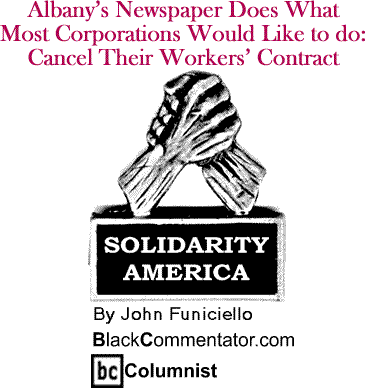
|
|||||||||||||||||||||||

|
|

Custom Search
|
|
 |
|
The
Hearst Corporation’s newspaper in
Hearst has done what so many employers in an industry in free fall want to do - get rid of the union. It’s as if unionized workers had been making management decisions over the generations and, by crushing them, the papers will miraculously make a come-back and start to make money again. If he doesn’t know that his method of “urging” a quick settlement is an old one, he hasn’t read any history. He has acted in a manner befitting a mine owner of the turn of the 19th Century, rather than an “enlightened” newspaper owner of the 21st Century. Canceling the contract is not a rational act. For decades, Capital Newspapers (the local manifestation of the giant print and broadcast empire of the Hearst Corporation) has negotiated with Local 34 long past the expiration date of the contract. They always worked under the conditions of the contract until a new agreement was reached. It’s past practice - long past practice. Although
management at the That’s
not unprecedented at the Times Union, because in the late
1960s, when there was a strike at the
The company’s union-busting lawyer (although they weren’t called that in those days) knew that such a thing would happen. With most of the union members, in effect, ineligible to vote, the union would be weakened and it was. It took a few years to straighten out the problem, but the company’s aims were accomplished - a weaker union. It took years longer to bring it back to life. Of course, this new-found life in the 1970s was in the context of an American union movement that was itself weakened by a full frontal assault on unions in the 1980s, by corporations and even by the government. One
of the demands of George Hearst in The union is looking into legal action, but a canceled contract also means that the union’s remaining members can picket, launch a boycott, or strike, although they can’t take a grievance to arbitration.
It’s a tough call for both sides. It pains reporters, editors, and all of the other workers in the union to call for a boycott. It’s their paper, too. The company is hoping that the local won’t be able to pull off a boycott, but, as the local president said, there are lots of union members in the circulation area - tens of thousands of them and most are old enough to still read a newspaper every day - and a boycott could be effective. The gamble by George Hearst is that the paper will stumble along and just survive in these very tough economic times, even though papers across the country are dropping one after another. What makes him think he can show his contempt for the people who do the work and still have a paper at the end of it all? It is a very big gamble. A few years ago, when the paper observed its 150th year, its editor, Rex Smith, after he had carefully read the entire issue of the then-Albany Morning Times in the archives of the State Library, in 2006 wrote, “…But as I read the founding editor’s relentlessly sincere and hopeful words in Vol. 1, No. 1, of the newspaper that I now edit, I got a lump in my throat. I closed my eyes and tried to imagine all the people who had worked hard to create the paper every day over these 150 years, somehow shepherding that little paper along and apparently making the right decisions, year after year, so that even as other newspapers were born and then died, and as other media emerged, the Times Union became what is today the region’s oldest and by far largest news organization.
Arbitrary
acts such as George Hearst’s are happening on a daily basis around
the Like so many employers at this time of economic stress for the nation, the Times Union management is trying to use the turmoil to its advantage, to the detriment or demise of Local 34. As O’Brien said, “You might as well change the name of the paper to the Times anti-Union.” BlackCommentator.com Columnist, John Funiciello, is a labor organizer and former union organizer.
His union work started when he became a local president of The
Newspaper Guild in the early 1970s. He was a reporter for 14 years
for newspapers in |
|
Any BlackCommentator.com article may be re-printed so long as it is re-printed in its entirety and full credit given to the author and www.BlackCommentator.com. If the re-print is on the Internet we additionally request a link back to the original piece on our Website. Your comments are always welcome. eMail re-print notice
If you send us an eMail message we may publish all or part of it, unless you tell us it is not for publication. You may also request that we withhold your name. Thank you very much for your readership. |
|
| |
|
| April
16 , 2009 Issue 320 |
|
| Executive Editor: Bill Fletcher, Jr. |
| Managing Editor: Nancy Littlefield |
| Publisher: Peter Gamble |
| Est. April 5, 2002 |
Printer Friendly Version
in resizeable plain
text format or pdf
format. |
| Frequently Asked Questions |
 |

|
 |
 |
 |
| |
| |





























 Hearst
in Albany continued to deduct the regular dues, but the lack of
an easy way to collect the assessment from 340 members who worked
365 days a year on all three shifts - a plant and business that
never slept - caused most of the union members to fall in arrears
on their obligations and, therefore, were not “in good standing,”
not eligible to vote on union issues.
Hearst
in Albany continued to deduct the regular dues, but the lack of
an easy way to collect the assessment from 340 members who worked
365 days a year on all three shifts - a plant and business that
never slept - caused most of the union members to fall in arrears
on their obligations and, therefore, were not “in good standing,”
not eligible to vote on union issues. But
as Tim
But
as Tim 
 How
proud can management be of their hostile act of canceling a contract
unilaterally and what it means to the women and men who actually
keep the Times Union a newspaper and not just an advertising
sheet. It’s a betrayal of the paper’s long history and all of
the people who made it a newspaper.
How
proud can management be of their hostile act of canceling a contract
unilaterally and what it means to the women and men who actually
keep the Times Union a newspaper and not just an advertising
sheet. It’s a betrayal of the paper’s long history and all of
the people who made it a newspaper.





